Olena Zelenska interview: War has pushed me close to psychological burnout
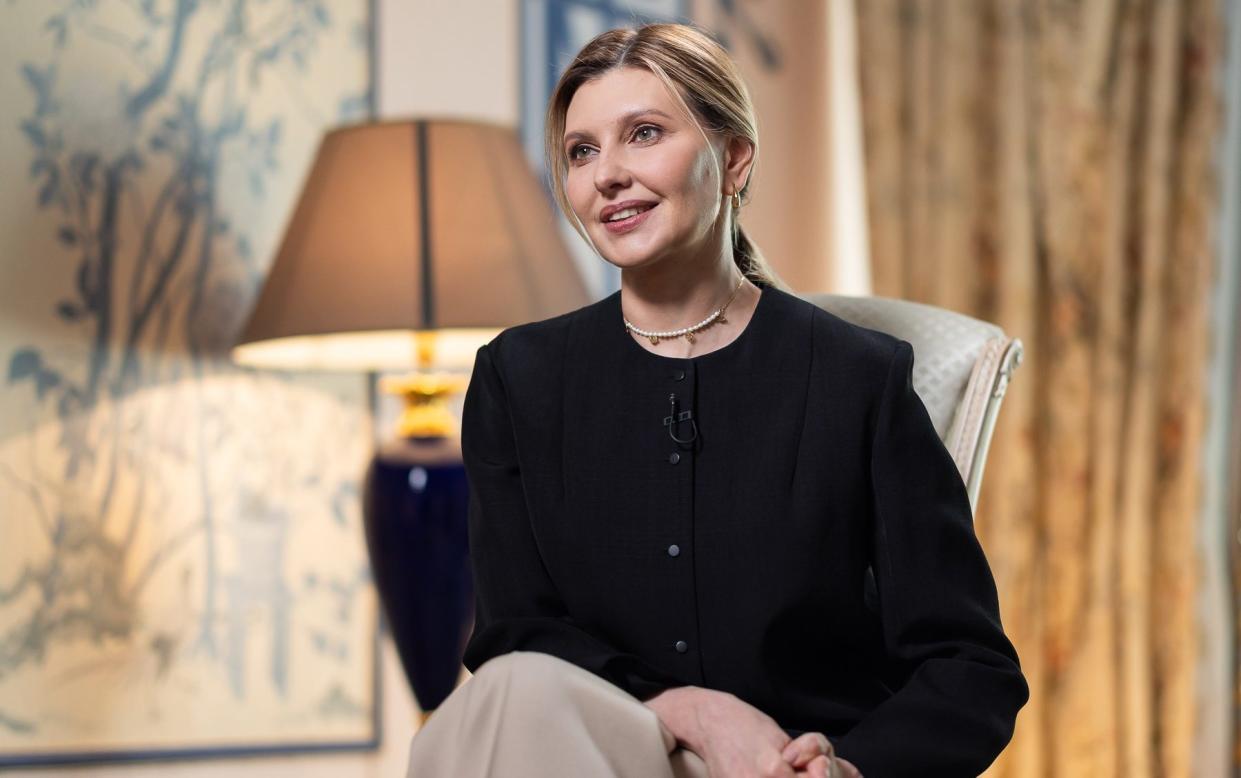
- Oops!Something went wrong.Please try again later.
- Oops!Something went wrong.Please try again later.
For many people in Ukraine, it is not president Volodymyr Zelensky, with his trademark green sweatshirts and regular addresses to the nation, who provides comfort to the war-ravaged country, but rather his wife, Olena Zelenska.
Composed, articulate and by her husband’s side on the international stage whenever their conflicting schedules allow, the first lady of Ukraine has inadvertently become a powerful symbol of hope.
Yet behind her polished exterior, Mrs Zelenska has battled with the same anxieties and vulnerabilities known to ordinary Ukrainians, who continue to suffer the agonising consequences of Vladimir Putin’s invasion.
In an interview from inside the office of the president in Kyiv, Mrs Zelenska told The Telegraph that she had come close to burnout as she struggled to cope with the magnitude of Putin’s war while maintaining a brave face for her country and her children.
“There are moments where I feel I am close to psychological burnout and I understand that I need rest,” Mrs Zelenska told The Telegraph.
“I try to use the moment effectively, because sometimes when we think we have rest, we don’t.”
Since the full-scale invasion began in February 2022, Mrs Zelenska and her husband have been forced to live apart. He stays at the office and she and their two children are at an undisclosed location.
Spending each night alone, she confessed to occasions where she had woken in the middle of the night feeling like she was struggling to cope – the only reprieve being that her children had not seen her in this state.
“Those were the most horrifying moments and it’s good it happened at night because none of my children saw it because I always have to be a source of confidence for them,” she admitted.
“Children always look up to their parents and they need to know that everything is going to be ok.”
As part of her new commitment to take care of her mental health, Mrs Zelenska said she has occasionally permitted herself to be vulnerable.
“A couple of times I allowed myself to cry when it was unbearably sad but it was something I did consciously because I know I have to dive deep to the bottom to find the power to push and then I can swim again,” she said.
“You have to allow yourself an opportunity to cry it all out.”

Her greatest hope for Ukraine is that its victory is not pyrrhic and she comes out the other side with her sanity intact.
“I hope to live until the moment of the victory in a sane state of mind and for us to arrive there not so exhausted that we won’t be able to enjoy it,” she said.
“I try to not think about fear, of course, we all in a way have survived our biggest fears in the first month after the invasion.
“We needed to come to terms with that idea in our head, with the nightmare that’s hard to imagine for a modern person. You try not to think about the most awful things because thinking about them is not helpful.”
To ward off such episodes, the first lady has coping mechanisms to ensure her “mental balance” is steady, such as trying not to read the news on her phone before bed, or scrolling through Telegram channels detailing Russia’s brutality before falling asleep to the sound of air sirens.
“I think when I am scared I need to physically do something,” she explained. “I can compile a list of things that calm me down, and I’ll go and do those things.”
Another of these activities is cleaning. “This is a recipe for many women I know in the world to calm down, if you don’t know what to do just go wash your hair,” she said, smiling. “While you are doing something you don’t just sit idly and be scared, you do something helpful at this moment.”
It is approaching 850 days since Putin launched his invasion of Ukraine, having annexed Crimea in 2014 after declaring he had reversed a historical mistake.
Putin famously called the carving up of the Soviet Union “the greatest geopolitical catastrophe of the 20th century”.
But in his bid to right this “mistake”, the General Staff of Ukraine’s Armed Forces has put the number of Russian troops killed since February 24 2022 at 529,750, not to mention the huge amount of military equipment Moscow has lost.
Despite this, Putin’s ambitions for reclaiming Ukraine fully as part of Russia remain undimmed, with the most intense fighting of the war taking place in Kharkiv Oblast, which borders Luhansk Oblast in the east of the country.
It is therefore crucial that the West does not grow weary of the war.
“We hope that the fatigue of this war will not settle the existential war for us, because our existence depends on it,” Mrs Zelenska said.
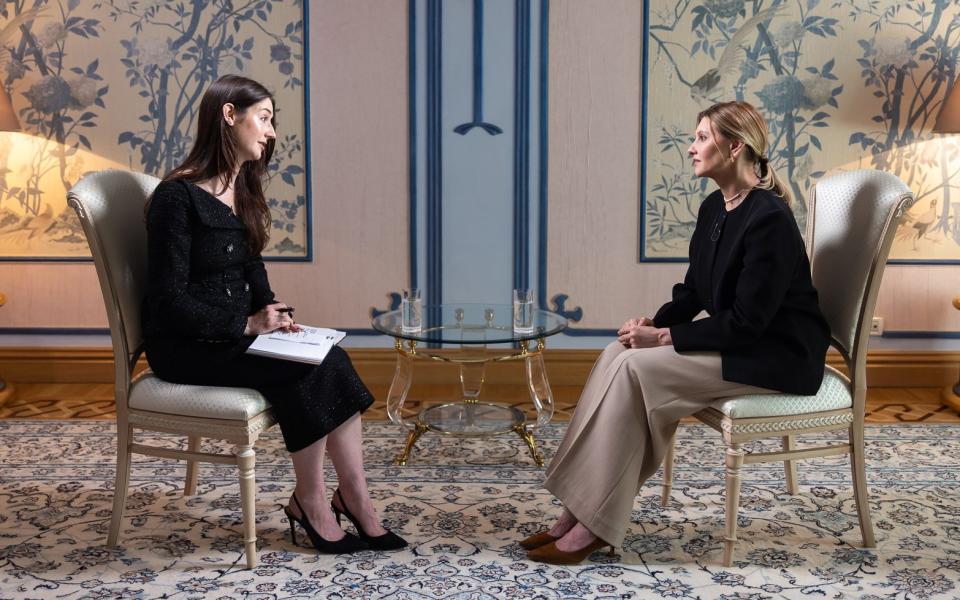
The recent Peace Conference in Switzerland provided her with some confidence that Ukraine’s allies and friends will continue to support it, although she conceded “we sometimes fear that help is arriving more slowly than we expected”. “Or not to the extent that we expected,” she added.
However, she admitted there is a general feeling of concern about the possible return of a Trump presidency and what that means, not only for Ukraine but the world.
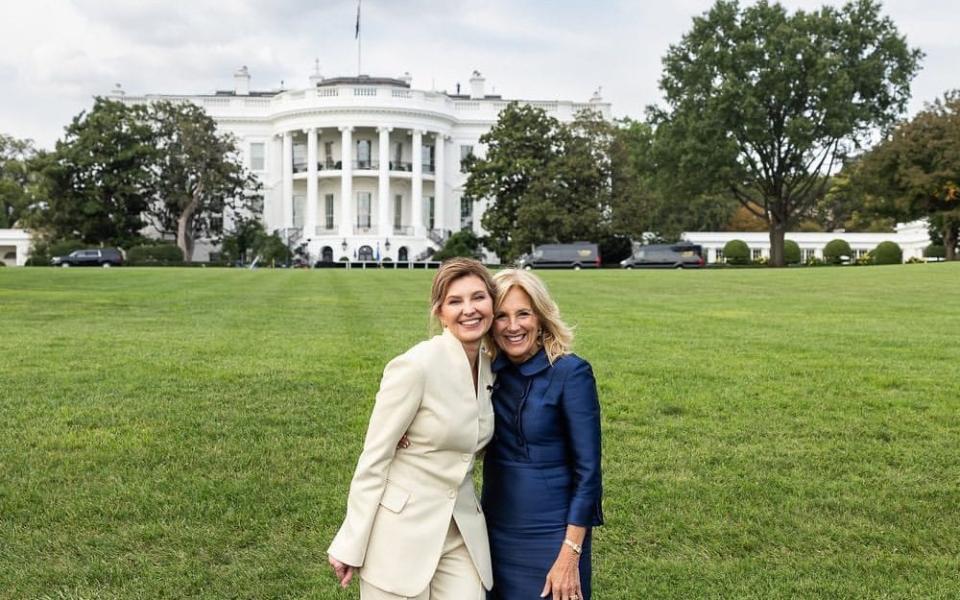
When Mrs Zelenska’s husband announced his intention to run for president in 2019, she was enjoying her life as a successful screenwriter and editor in comedy at Studio Kvartal 95. Her husband had co-founded the production company, named after the comedy group they had performed in as young adults.
Originally from Kryvyi Rih, Dnipropetrovsk Oblast, the pair, now both 46, first met as teenagers when they attended School No. 95. Their paths crossed again on the KVN circuit, a Russian comedy show which hosted international competitions. They went on to create sketches as part of a group that won comedy competitions across Ukraine and ultimately developed a romantic relationship.
Today, her life in war-ravaged Ukraine could not be further from the one she left behind in 2019, which included a career she loved.
“Nobody would ever dream of being a wife of a president of a country at war,” she said when asked by The Telegraph to explain what it was like being married to Mr Zelensky.
“Of course it’s hard, it wasn’t my choice and everyone knows it was his decision and I had to choose whether to work as the wife of the president or go into the shadows. I opted for the first option. When you make the choice to become active, you treat it as a job, this is my job now.”

Any time they get to spend together is sparse and the “complicated” family dynamic they have is also taking its toll on the president.
“Sure enough we want that to change because family needs normal life, children need their father more often than they can afford seeing him and he is getting tired of that lifestyle,” she said.
There is also the added pressure of the world’s eyes on their marriage. She knows people look to her and Mr Zelensky as a united front who together provide hope that all will be fine with their country. While putting on such a show can be draining, she said, it is also, at times, rewarding.
“You have to understand that people look at you and you have to support them,” Mrs Zelenska said.
“You have to give them hope and confidence, regardless of your emotional state. You have to be supportive for the people and at times it really is hard, but at other times it’s really inspiring when you see people support you back. I feel such gratitude to be honest that it’s worth it.”
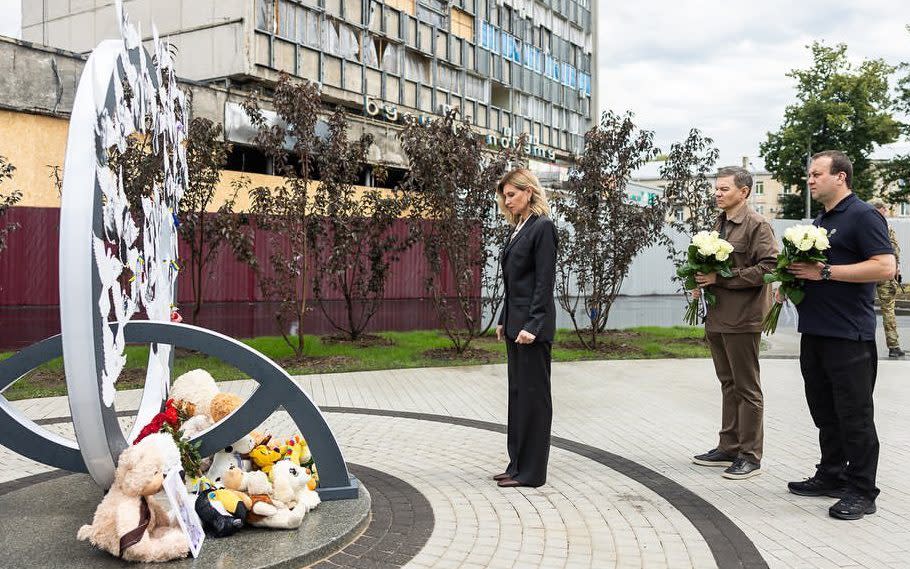
As testing as her own personal situation might be, Mrs Zelenska said people all over Ukraine are suffering from families torn apart by Putin’s war.
“At least we can still see each other,” she said, adding that she had “a lot of compassion for the wives of our military who sometimes for months go without knowing where their near and dear are, or women whose husbands and sons are prisoners in Russia. They don’t give up”.
Despite the obstacles that have been put in their way their marriage remains strong. Mrs Zelenska joked this could be because of the infrequency of their encounters as it meant they always had something new to tell each other. “We don’t bore each other, we miss each other,” she added. “We don’t have the time to make each other angry or have a fight, so recently we don’t have fights at all.”

In her role as the president’s wife, Mrs Zelenska has sought to bring about a positive change in Ukrainian culture by getting people to talk about mental health. Last year she launched a nationwide programme called ‘How are you?’ which, in partnership with the Ministry of Health of Ukraine, aims to encourage Ukrainians to focus on their mental health as part of their daily routine.
Its overall purpose is to foster a culture of self-care in a society where she feels the impact of talking therapies has been overlooked. According to surveys conducted in the aftermath of the full-scale war, more than 90 per cent of Ukrainians experienced anxiety, with almost 60 per cent said to be at risk of developing mental disorders.
However, in a culture where people are more inclined to downplay issues with their mental state out of fear of looking like they are complaining, there is a long road ahead to making investing in this part of their lives normal.
And while Mrs Zelenska is a proponent of counselling, the prospect of couples therapy for her own relationship is perhaps a step too far.
“If people are starting to treat individual counselling with more appreciation, that starts happening, more people turn to experts, this is one of the many lines of work that we need to do in our society, but couples counselling we still need to talk about, very few people believe that it works,” she said. “Yes, we see it in movies and we understand this is more a Western, cultural story, but I’m confident we need to develop that along with other routines for our people to take care of themselves. I hope that me and Volodymyr won’t need that therapy.”
In the days after Russia invaded Ukraine, Mrs Zelenska, in a state of composed fear as her family was split up and she and her children were forced into hiding for their safety, turned to literature for help. The first book she picked up was George Orwell’s 1984, using the dystopian narrative to make sense of how so many Russians had been manipulated into believing Putin’s justifications.
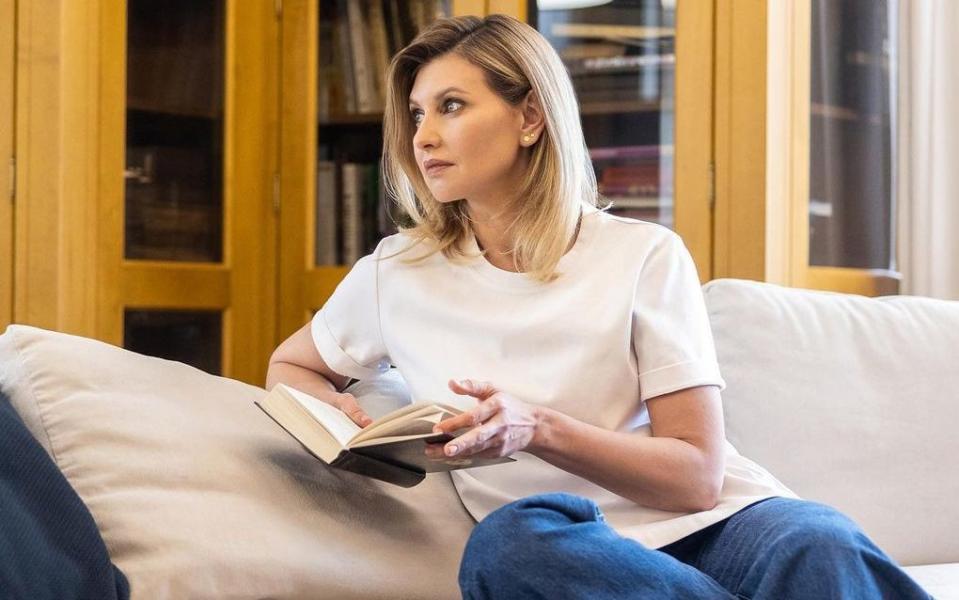
“There is some sort of psychological paradox,” Mrs Zelenska said. “It is probably the same thing when people watch horror movies. When you read something horrible, you understand this isn’t real life and maybe it’s easier for you to take it in. So, after the beginning of the big war, I caught myself reading things I would stop reading previously because I was scared. For instance, I read again Orwell’s 1984. I don’t like the dystopia genre, but at that point in the war I needed that, I needed to read it once again and see how awful the fall of society may be.”
She said the novel about the dangers of totalitarian societies reminded her “how people may lose touch with reality”.
“Maybe that helps me to react less emotionally to the news on the other side because when you see how much the brains of the citizens of the neighbouring country have been worked on, then you recall Orwell and you come to believe that everything is possible”.
Later this year Mrs Zelenksa will host the Summit of First Ladies and Gentlemen, which is now in its fourth iteration. What began as a way to unite first couples internationally has garnered practical results for Ukraine. In 2022 the summit led to the purchase of 92 ambulances for the country, last year it established medical partnerships internationally and this year they aim to focus on the safety of children.
“Children are the first victim of any war or any military conflict,” she said, citing the militarisation of children, as well as kidnapping, deaths and a lack of access to healthcare and education. With so much of children’s education being taught online due to bombings and missile attacks, the summit will focus on online safety, including how to counter disinformation and cyber bullying.
In the immediate term, Ukraine is looking at building underground schools so that children can return to classrooms safely and have the ability to interact with their classmates and schoolteachers. Mrs Zelenska added that her greatest hope was for children to physically return to school.
Despite Russia’s unrelenting assault on Ukraine, the first lady still finds moments to be positive about.
“There are always things to be happy about, even in these most horrifying moments that happened to us, we still see the manifestations of humanity around and this is incredibly inspiring,” she insisted.
“The most horrifying moments we keep witnessing – the rubble of residential buildings being gone through and people retrieved from there – every time I look at the rescuers who arrive on site, I watch them work and I’m incredibly grateful to those people. I just look at their faces. I look at them, how concentrated they are and how they work. It inspires even in the worst moments and it doesn’t let you succumb to discouragement because you realise you did so little to get tired that you need to go and keep working.”


